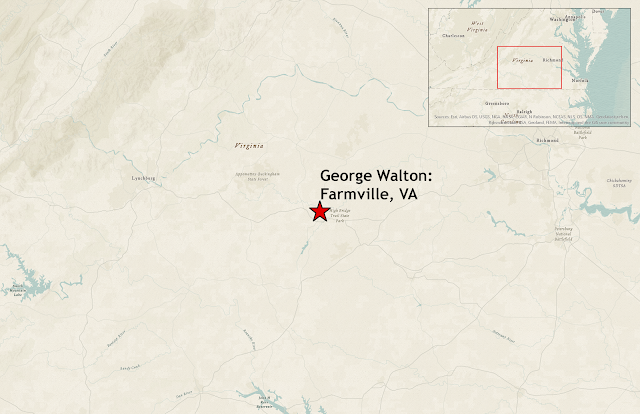Founding Fathers - George Walton
George Walton
Born: ?? (Farmville, VA)
Died: February 2, 1804 (Augusta, GA)
As you can see from the information above, there is a bit of mystery about this week's subject - George Walton. The details of his birth are unclear, with some believing he was born as early as 1740 or 1741 and others thinking date of 1749 or 1750 is more accurate. If the latter time frame is to be believed, then George Walton may be the youngest man to sign the Declaration of Independence. That would be the second superlative of his, since his name is also the very last alphabetically. He was born somewhere near Farmville, Virginia, but the exact location is unknown and has been attributed to both Cumberland County to the north of town as well as Prince Edward County, which includes the center of town and those areas to the south. While he was still very young George was orphaned upon the death of both parents, and he was taken in by an uncle to be raised in a household of 13 children. This uncle was a carpenter and wanted George to follow in that trade, but during his apprenticeship the young man showed that he preferred to study law, and he began borrowing legal books to study at night. Almost inexplicably, the uncle was angered by the thought of George focusing on learning rather than labor, and he was denied so much as a candle to read by in the late night hours. Not to be deterred, however, the young Walton gathered wood scraps from his carpentry work and burned them at night for a reading light.
In 1769, George Walton's apprenticeship came to an end and he decided to move to Savannah, Georgia, in order to pursue a legal career. The southernmost colony of Georgia was the youngest foothold of British control in the New World, having been established in 1733 by James Oglethorpe during the reign of King George II. The colonial charter had strict rules that discouraged nobility and other upper class residents, including small land grants and restrictions on purchasing slaves or alcohol, although those rules would be abolished after a decade when Oglethorpe left. Large numbers of colonists did not arrive in Georgia until after the French and Indian War was concluded in 1763, which shifted control of Florida from Spain into British hands. A colony that lacked a strong upper class was an ideal place for a person of humble background like Walton who, after being admitted to the bar in 1774 and married to socialite Dorothy Camber in 1775, began to find success both professionally and politically. While becoming one of Georgia's most prominent attorneys he became involved in the cause of freedom and was present at the very first meeting in Savannah of individuals seeking to preserve the liberties of residents against British encroachments. After serving for a year as the secretary of the colony's Provincial Congress was one of three delegates selected in 1776 to travel to Philadelphia and represent Georgia in the Continental Congress. Once the Declaration was signed, Walton continued to serve in the continental government for an additional two years before returning home to fight.
Commissioned as a colonel in the state militia, George Walton participated in the Battle of Savannah in 1778, where he was shot and captured by British forces and held for ten months until being released in a prisoner exchange in 1779. Just one month later, he was elected to serve as governor of Georgia but only served two months before returning to Congress for two years. His brief time as governor was not without scandal, however, as he was involved with a fatal duel between his friend, General Lachlan McIntosh, and fellow signer and political foe, Button Gwinnett. Upon Gwinnett's death, McIntosh was relieved of his military command and five years later Walton was officially censured by the legislature, and was even horse-whipped by McIntosh's son, William, who was serving as a captain at the time. Nevertheless, Walton continued serving admirably in various roles in all three branches of government - by the end of his career he had served as governor twice, chief justice of Georgia three times, member of Congress five times, and US senator once. Additionally, he founded an academy, raised two sons, and helped to plan and develop the city of Augusta as it began to grow. During his second term as governor, he guided Georgia to ratify the new Constitution and oversaw the movement of the state capital to Augusta. He later served as a state Elector during the first presidential election in 1789 and completed one year of an elected term in the US Senate before retiring, possibly due to health concerns stemming from frequent attacks of gout. After an extended career of public service Walton retired from his congressional career to return to Georgia, becoming a farmer and serving as Chief Justice until his death in 1804.
The signature of George Walton can be found as the third name on the first column beneath the Declaration of Independence.




Comments
Post a Comment